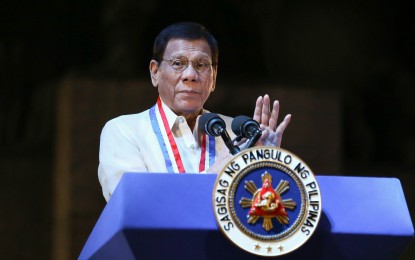
President Rodrigo Duterte
MANILA -- President Rodrigo Duterte on Monday reiterated his willingness to accept Rohingya refugees fleeing war and persecution in Myanmar.
“Ako (Me), I am prepared. I have communicated my desire na ‘yung mga Rohingya sa Burma kung gusto nilang mag-migrate, tatanggapin ko sila (I am prepared. I have communicated my desire that if the Rohingya refugees in Burma want to migrate, I will accept them here),” Duterte said in a speech in Cotabato City.
“Malaki ang lupa natin, kawawa naman ‘yang mga tao doon, ‘yung mga Muslim na… (We have big lands, the people there are pitiful, the Muslims..),” he added.
Duterte urged neighboring countries Malaysia and Indonesia to do the same.
“Maghati-hati tayo (Let’s share among us): Malaysia, Indonesia, Philippines. Ako (Me) I’m ready to accept,” Duterte said.
He recalled how Bataan and Palawan took in Vietnamese “boat people” fleeing the Vietnam War between 1975 to 1992.
“Nagtanggap man tayo noon ng mga Vietnamese ‘di ba? Panahon ng Amerikano diyan sa Palawan (Didn’t we accept Vietnamese in the past? During the American period there in Palawan),” Duterte said.
Last year, Duterte has said he was willing to accept Rohingya refugees in the Philippines, believing that genocide was apparently taking place in Myanmar.
In February this year, the President reiterated he wanted to help the Rohingya refugees, criticizing the supposed inaction of the United Nations (UN) and the European Union (EU) to address their plight.
The Rohingya, often described as "the world's most persecuted minority", are an ethnic group, majority of whom are Muslim, who have lived for centuries in Myanmar. Currently, there are about 1.1 million Rohingyas in the Southeast Asian country.
The Philippines’ open-door policy to refugees can be traced back to 1923 when the country took in the first wave of White Russians fleeing from the Socialist Revolution, according to the United Nations High Commissioner for Refugees (UNHCR).
The country also admitted Jewish refugees in 1934, Spanish Republicans in 1939, Chinese refugees in 1940, White Russians in 1949, Vietnamese “boat people” in 1975, Iranian refugees in 1979, Indo-Chinese refugees in 1980, and East Timor refugees in 2000. (PNA)
